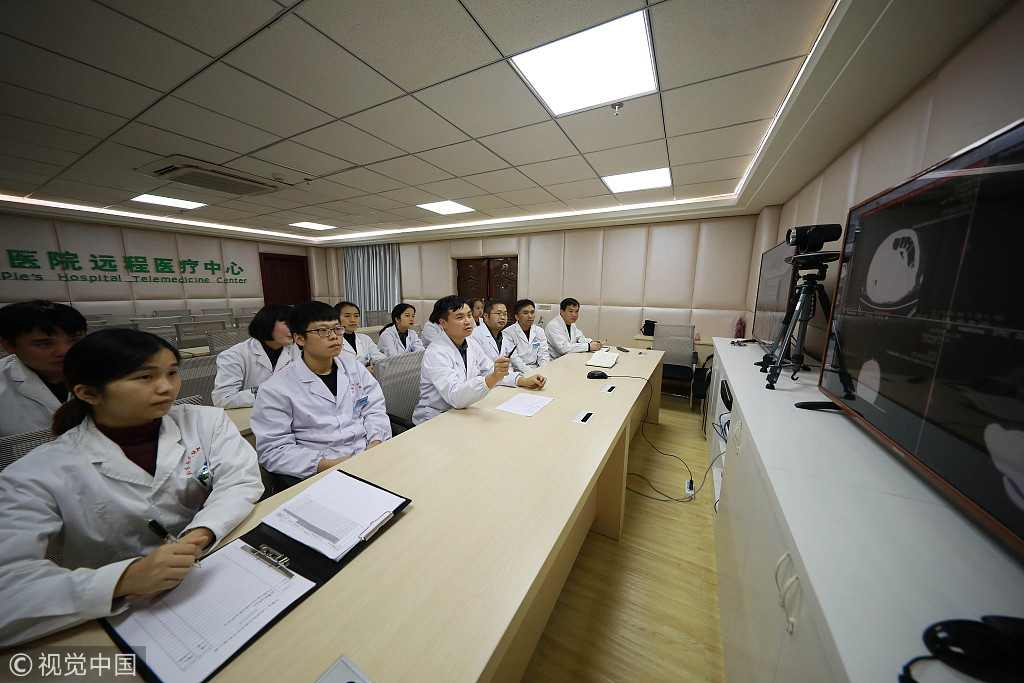
Health
12:07, 17-Mar-2019
China performs first 5G-based remote surgery on human brain
By Gao Yun, Pan Zhaoyi, Cao Qingqing

A patient suffering from Parkinson's disease has received China's first 5G-based remote surgery with a deep brain stimulation (DBS) implant, according to local media.
Chinese PLA General Hospital (PLAGH), with the help of China Mobile and Huawei 5G technology, carried out the operation on Saturday.
Conducted by Ling Zhipei, chief physician of the First Medical Center of the Beijing-based PLAGH and Department of Neurosurgery of PLAGH's Hainan Hospital, the surgery lasted for about three hours.
Ling started the operation at 9:00 a.m. in Sanya City, manipulating the surgical instruments 3,000 kilometers away in Beijing with micron precision on a computer through a 5G network, and successfully implanted the DBS at the optimal target site.
"I feel good," said the patient after the surgery.
"I take turns working in Beijing and Hainan, and the operation took place during my Hainan rotation. A patient with Parkinson's in Beijing needed surgery and couldn't fly to Hainan," said Ling.
"The 5G network has solved problems like video lag and remote control delay experienced under the 4G network, ensuring a nearly real-time operation. And you barely feel that the patient is 3,000 kilometers away."
In the future, high-quality and high-level experts from superior hospitals will be able to operate remotely and directly on patients in remote areas through remote surgery, completing operations which were previously difficult to finish at the grassroots-level hospitals, Ling added.
The success of the remote surgery has realized a major breakthrough in China's telemedicine, from remote observation, consultation and guidance to operation.

The remote surgery powered by 5G technology is one of the latest attempts by people working in different sectors. /VCG Photo
The remote surgery powered by 5G technology is one of the latest attempts by people working in different sectors. /VCG Photo
As one of the most common diseases among the aging population, Parkinson's disease is a brain disorder that leads to impairment of voluntary movements, as well as trembling, slowness and stiffness.
There were 6.1 million individuals with Parkinson's disease globally in 2016, compared with 2.5 million in 1990, according to a report published in The Lancet Neurology.
Although there is no cure for the disease, DBS can be a life-changing treatment for some people.
A successful operation allows people to potentially reduce their medications and improve their quality of life.

Doctors in a hospital in southwest China's Guizhou Province conduct telemedicine. /VCG Photo
Doctors in a hospital in southwest China's Guizhou Province conduct telemedicine. /VCG Photo
Actually, this is not the first remote surgery successfully conducted with the support of 5G technology.
Last Tuesday, a complicated hepatic operation was done in a hospital in Shenzhen under the real-time instructions of an expert in Beijing, thanks to the high-definition images transmitted through live-streaming enabled by the high-speed 5G Internet.
Originally, the Shenzhen People's Hospital, where the operation was conducted, sought on-site surgical planning and guidance from Dong Jiahong, an internationally renowned hepatic surgeon based in Tsinghua Chang Gung Hospital in Beijing, as the surgery was too difficult for local doctors to handle.
But thanks to the low latency, large bandwidth and high reliability of the 5G Internet transmission, Dong was able to supervise the real-time situation in the operation room 2,200 kilometers away in Shenzhen and give instructions.
Before that, the doctors in the two hospitals had jointly conducted an online assessment of the patient and completed the accurate design of the surgery.
"The advent of the 5G era has enabled doctors to carry out remote multi-party preoperative planning and surgical collaboration," Dong said, as restrictions on time and space are broken.
The remote surgery powered by 5G technology is one of the latest attempts of people working in different sectors. Its success has paved the way for future relevant research and bridged the gap of medical resource imbalance among different regions.
As 5G technology becomes more mature, its applications in the transportation, agriculture and healthcare industries are bound to flourish even more than the 4G era.
(Cover via VCG)

SITEMAP
Copyright © 2018 CGTN. Beijing ICP prepared NO.16065310-3
Copyright © 2018 CGTN. Beijing ICP prepared NO.16065310-3